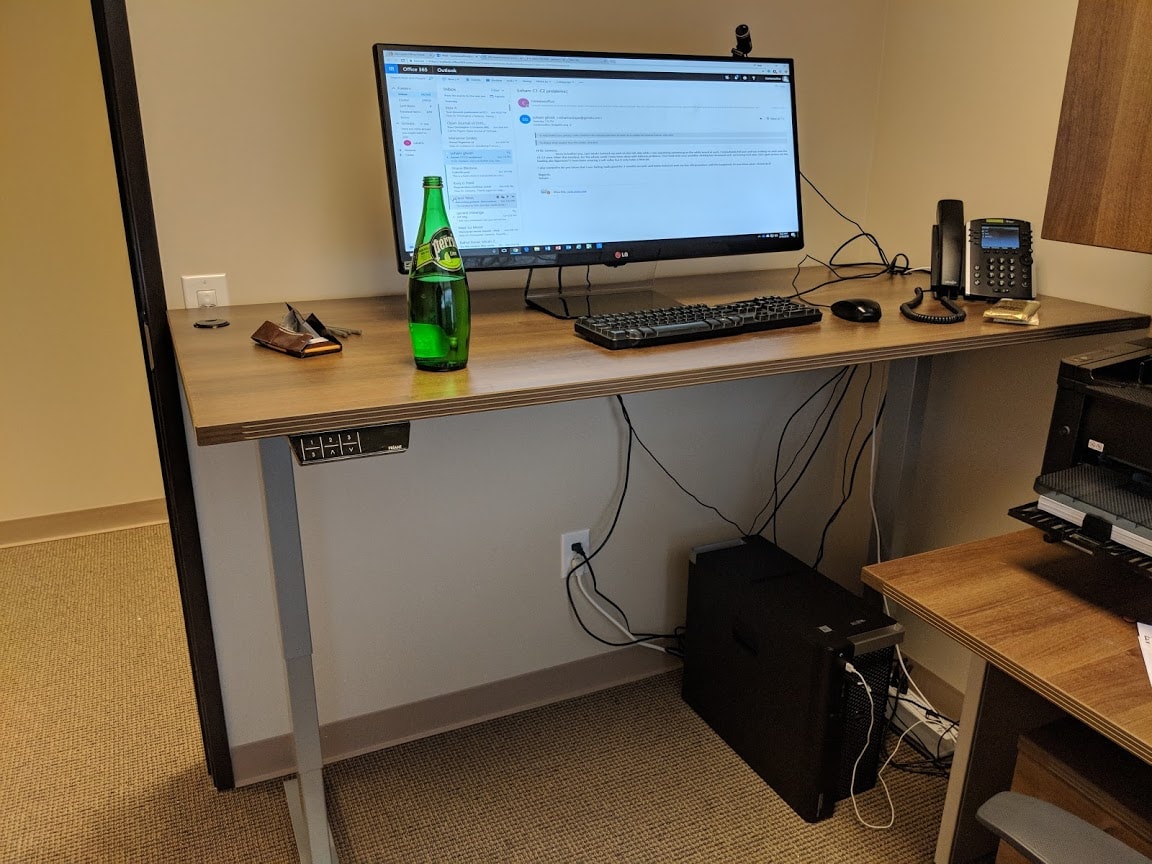Can Exercise Offset the Risk of Too Much Screen Time?
We’ve all seen the headlines, sitting is the new smoking. In fact, the data is getting so convincing that sitting is “Risky Business.” However, a new study may make all of us who exercise regularly a little less paranoid. Let me explain.
Meet My Standing Desk
I now do my desk work at one of these, as do all of our doctors. It was very tough the first few weeks, but after an adjustment period, I was able to get used to spending about 60% of my usual sitting day standing. So for everything discussed in this blog, a simple solution is always to stand more and sit less.
Regular Physical Activity May Balance the Adverse Health Effects of Screen Time
Screen time in the new study was defined as leisure time (work-related screen time was not counted as screen time) spent watching a television or computer screen. Screen time has been associated with an increased risk of cardiovascular disease and cancer as well as all-cause mortality (death from any cause); the purpose of the new study was to determine if fitness levels of participants impacted these risks. There were over 390,000 participants, all with no history of prior or current heart disease, cancer, and other chronic diseases, who completed questionnaires and underwent examination. Information obtained and followed over time on the participants included screen time, fitness activities and grip strength, the incidences of disease, deaths, and so on.
The results? Those with less physical activity and weaker grip strength were almost twice as likely to develop cardiovascular disease or cancer or die from any other disease. Additionally, when researchers removed all factors except screen time from the analysis (e.g., exercise, grip strength, body mass, and other factors)—in other words, simply comparing the amount of screen time in general—those with more time in front of the screen had a greater risk for heart disease, cancer, and other potentially fatal diseases. Researchers concluded that being stronger and more physically active reduces the adverse health effects of screen time and therefore lowers the risks of heart disease, cancer, and other fatal diseases.
Exercise or Not, Less Screen Time Should Be the Goal
Please understand, for those of you who exercise, this study isn’t a golden ticket to add more screen time or acknowledgment that excessive screen time is OK as long as you’re sweating it out at the gym for an hour a few days a week. It simply means that those who are clocking a lot of screen time and who are also mostly sedentary (no regular fitness routine) reduce your risks by adding regular exercise to your lifestyle. As the study pointed out, removing all other factors, more screen time in general equals more risk of fatal disease and potentially death. So exercise or not, less time in front of those screens should be the goal.
Screen Time Can Also Be Detrimental to Sleep
Screen time affects our health in more ways than just keeping us less active, increasing our risk of fatal diseases. It can also be extremely disruptive to our sleep cycle, and a good night’s sleep is critical to restoring us not just physically but also mentally each day as while we sleep, debris is swept from our brains and our brain cells are recharged.
At night, after the sun goes down, our bodies (which function on a natural sleep-wake cycle called the circadian rhythm) begin to secrete melatonin, a hormone that tells the body to sleep. We have certain neurons in our eyes (called retinal ganglion cells) that are light sensitive, and these neurons signal to the area of the brain responsible for our circadian rhythm. When these neurons are stimulated by a certain type of light (in this case, the artificial blue light from our screens [e.g., computer, television, smartphone, tablet, etc.]), they tell this part of our brain that it’s still daytime—halt the melatonin. Slowed melatonin secretion, in turn, keeps us from falling asleep or sleeping well, and people who can’t sleep often turn to yet even more screen time…it’s a vicious cycle. For those who must use their screens after dark, studies have shown that blue-light-blocking devices, such as glasses, apps, and screen filters, can be an effective solution for better sleep.
So whether it’s minimizing your risk of disease or just getting better sleep, the less screen time the better.
The upshot? Do you remember the Porsche commercials of the ’80s? I think the catchphrase was something like, “Porsche, there is no substitute.” So I’ll invoke the same here. Exercise is key. There is no substitute.

If you have questions or comments about this blog post, please email us at [email protected]
NOTE: This blog post provides general information to help the reader better understand regenerative medicine, musculoskeletal health, and related subjects. All content provided in this blog, website, or any linked materials, including text, graphics, images, patient profiles, outcomes, and information, are not intended and should not be considered or used as a substitute for medical advice, diagnosis, or treatment. Please always consult with a professional and certified healthcare provider to discuss if a treatment is right for you.

